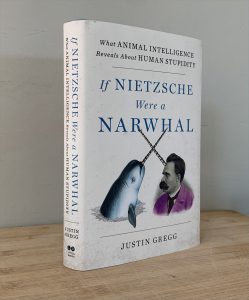 Picking up from where I left off yesterday.
Picking up from where I left off yesterday.
My basic summary of this book is: humans are not “stupid”; the issue is that human intelligence has both good and bad consequences, and apparently we can’t have the good without the bad. The bad is that humans don’t anticipate long-term consequences, such as climate change, and the issue is whether humanity can overcome short-term thinking to save itself. Yet the overall theme is that animals have intelligence, and consciousness, in their own way; and humans are not necessarily ‘happier’ than any of them. And many animals may long outlast the human species.
I especially appreciate the term “prognostic myopia” as one example of how humans are comfortable thinking in the short term – perhaps a couple decades, the time it takes children to mature – but not think long-term. And how maybe this is the solution to Fermi’s Paradox.
Remainder of summary:
- Ch 5 The Mystery of the Happy Bee. About the “c” word consciousness. Are honeybees, dogs, chickens, conscious? Animal studies and behaviors suggest they are, to some extent. Humans aren’t ‘more’ conscious than animals, we’re just conscious of more things. Emotions that become conscious are called feelings. There are various kinds of self-awareness: aware of being aware.
- Ch 6 Prognostic Myopia. This is the author’s term for a kind of cognitive dissonance, the inability to anticipate future outcomes. (It seems to be the author’s own term.) Thus we keep planting lawns (Harari used this example), eating bananas, and staying up too late, despite knowing the downstream consequences, planetary or personal. Why the oil industry keeps going. This is perhaps the most dangerous flaw in human thinking, that in one way or another will lead to extinction of the species. The author apologizes to future generations. [[ This is a key concept, and the term is my most useful take-away from this book. Further, this is central to how science fiction thinks differently about the future than the average person does. By nature, SF takes the long view and tries to anticipate consequences. ]]
- Ch 7 Human Exceptionalism. So is humanity winning? Other animals engage in thrill-seeking, but only humans plan for it. The glories of human culture, humanity’s greatest achievements, don’t count for much if our species goes extinct. (The three most likely ways: nuclear holocaust; climate change; ecological collapse.) Success, what ‘matters,’ is perhaps whatever generates pleasure both currently and in the foreseeable future. (Citing Bentham and Mill, echoing Harris and others.) Are humans happier than other species? Author concludes, given differing cognitive abilities, no. Author wonders of the utopia of Star Trek is a fantasy, contrasting the optimism of Steven Pinker with the pessimism of John Gray, who doesn’t see progress, only cycles of gain and loss. Final thought: A cow is arguably happier than RN, Nietzsche, was; he would have been better off as a narwhal. If we don’t solve the problems our exceptional minds have created, we will wink out of existence.
- Epilogue: Why Save a Slug? Author reflects that, despite high-minded theorizing, he tries not to drive over slugs on his driveway. He researches animals, but not animal captives. But he does kill mosquitoes. Different cultures have different norms, e.g. eating dogs v whales. But all animals have consciousness, qualia-filled minds.





